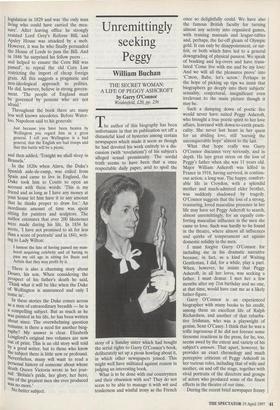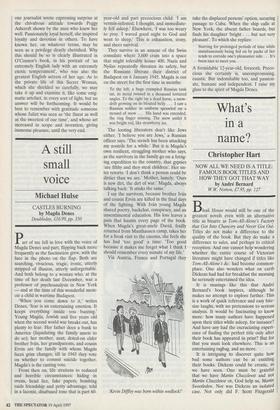Unremittingly seeking Peggy
William Buchan
THE SECRET WOMAN: A LIFE OF PEGGY ASHCROFT by Garry O'Connor Weidenfeld, £20, pp. 236 The author of this biography has been unfortunate in that its publication set off a distasteful kind of hysterics among certain newspapers which made it seem as though he had devoted his work entirely to a dis- cussion (with 'revelations') of his subject's alleged sexual promiscuity. The sordid truth seems to have been that a once respectable daily paper, avid to spoil the story of a Sunday sister which had bought the serial rights to Garry O'Connor's book, deliberately set up a pious howling about it, in which other newspapers joined. This might well have militated against reason in judging an interesting book.
What is to be done with our countrymen and their obsession with sex? They do not seem to be able to manage it with wit and tenderness and wistful irony as the French once so delightfully could. We have also the famous British faculty for turning almost any activity into organised games, with training manuals and league-tables and, perhaps, the far-off gleam of Olympic gold. It can only be disappointment, or sur- feit, or both which have led to a general downgrading of physical passion. We speak of bonking and leg-overs and have trans- lated 'Come live with me and be my love/ And we will all the pleasures prove' into `C'mon, Babe, let's screw.' Perhaps in the hope of picking up tips we insist that biographers go deeply into their subjects' sexuality, conjectural, insignificant even irrelevant to the main picture though it may be.
Such a damping down of poetic fire would never have suited Peggy Ashcroft, who brought a true poetic spirit to her love affairs, leavened with down-to-earth practi- cality. She never lost heart in her quest for an abiding love, still 'nursink the unconquerable hope' almost to the last.
What that hope really was Garry O'Connor discusses very seriously, and in depth. He lays great stress on the loss of Peggy's father when she was 11 years old. Major William Ashcroft was killed in France in 1918, having survived, in continu- ous action, a long war. The happy, comfort- able life in Croydon, with a splendid mother and much-admired elder brother, was suddenly shadowed by tragedy. O'Connor suggests that the loss of a strong, reassuring, loved masculine presence in her life may have set Peggy Ashcroft to search, almost unremittingly, for an equally com- forting masculine influence in the men she came to love. Such was hardly to be found in the theatre, where almost all influences and quirks of temperament act against domestic solidity in the men.
I must forgive Garry O'Connor for including me in his dramatic narrative because, in fact, as a kind of Waiting Gentleman, I did, for a while, play a part. When, however, he insists that Peggy Ashcroft, in all her loves, was seeking a father, I must demur. I met her a few months after my 21st birthday and no one, at that time, would have cast me as a likely father-figure.
Garry O'Connor is an experienced biographer with many books to his credit, among them an excellent life of Ralph Richardson, and another of that rebarba- tive Irishman, who was a playwright of genius, Sean O'Casey. I think that he was a trifle ingenuous if he did not foresee some tiresome reactions in the press, for he, too, seems awed by the extent and variety of his subject's amours. That apart, however, he provides an exact chronology and much perceptive criticism of Peggy Ashcroft in her various roles, including that of wife and mother, on and off the stage, together with vivid portraits of the directors and groups of actors who produced some of the finest effects in the theatre of our time.
During the recent brief newspaper frenzy one journalist wrote expressing surprise at the chivalrous attitude towards Peggy Ashcroft shown by the men who knew her well. Passionately loyal herself, she inspired loyalty and devotion in others. To have known her, on whatever terms, may be seen as a privilege dearly cherished. Why this should be so is clearly illustrated in O'Connor's book, in his portrait of 'an extremely English lady with an extremely exotic temperament', who was also the greatest English actress of her age. As to the private life of this Secret Woman, which she shielded so carefully, we may take it up and examine it, like some enig- matic artefact, in every sort of light, but no answer will be forthcoming. It would be best to remember with gratitude someone whose Juliet was seen as 'the finest as well as the sweetest of our time', and whose art increased in scope and invention, giving immense pleasure, until the very end.



































































 Previous page
Previous page